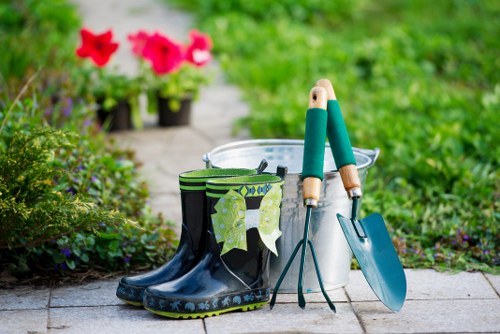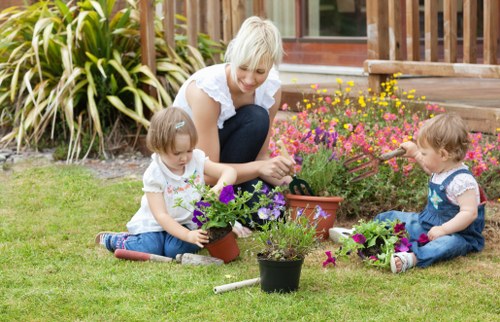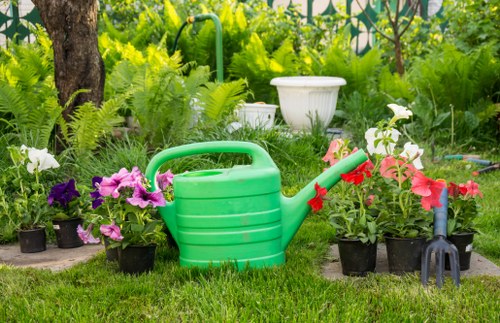Garden Fencing Richmond

Introduction to Garden Fencing in Richmond
Garden fencing is an essential element for any property in Richmond, offering both aesthetic appeal and practical benefits. Whether you’re looking to enhance your garden's beauty, provide privacy, or keep pets and children safe, the right fence can make a significant difference.
Choosing the appropriate garden fencing involves considering various factors such as material, design, and installation. Richmond homeowners have a wide range of options to suit their specific needs and preferences.
This article delves into the different types of garden fencing available in Richmond, the benefits they offer, and guidance on selecting the best option for your garden.

Types of Garden Fencing Available in Richmond
Richmond offers a diverse selection of garden fencing options, each with its unique advantages. Here are some of the most popular types:
- Wooden Fences: Classic and versatile, wooden fences can be customized to match any garden style.
- Vinyl Fences: Durable and low-maintenance, vinyl fences are an excellent choice for busy homeowners.
- Metal Fences: Offering both strength and elegance, metal fences like wrought iron or aluminum are perfect for adding a touch of sophistication.
- Composite Fences: Combining wood and plastic materials, composite fences provide durability without frequent upkeep.
- Bamboo Fences: Eco-friendly and unique, bamboo fences add a natural aesthetic to your garden.
Each type of fence has its own set of benefits, making it essential to evaluate your specific needs before making a decision.
Consider factors such as your budget, the level of maintenance you’re willing to undertake, and the overall style you want to achieve in your garden.

Benefits of Installing Garden Fencing
Investing in garden fencing offers numerous benefits for Richmond homeowners:
- Privacy: A fence provides a private outdoor space where you can relax without prying eyes.
- Security: Fencing can deter unwanted visitors and keep pets and children safe within your property.
- Aesthetic Appeal: A well-chosen fence enhances the overall look of your garden, complementing your home’s architecture.
- Boundary Definition: Clearly marks the boundaries of your property, preventing disputes with neighbors.
- Wind Protection: Acts as a barrier against strong winds, protecting plants and outdoor furniture.
These benefits not only improve the functionality of your garden but also contribute to the value of your property.
When selecting a fence, think about how each feature aligns with your personal needs and the specific conditions of your garden space.

Choosing the Right Material for Your Garden Fence
Selecting the right material is crucial for ensuring that your garden fence meets both your aesthetic and functional requirements. Here are some common materials used in Richmond:
- Wood: Offers a natural look and can be painted or stained to match your garden’s color scheme.
- Vinyl: Resistant to weather elements and doesn’t require painting, making it a low-maintenance option.
- Metal: Provides a sturdy and elegant appearance, ideal for formal gardens.
- Composite: Combines the best of wood and plastic, offering durability and minimal upkeep.
- Bamboo: Sustainable and visually appealing, perfect for creating a tropical or rustic vibe.
Consider the climate in Richmond and how each material performs under local weather conditions. For example, metals like aluminum are resistant to rust, making them suitable for areas with high humidity.
Your choice should also reflect the maintenance you're willing to perform. While wood may require regular staining, vinyl and metal fences typically need less upkeep.

Installation and Maintenance Tips
Proper installation is key to the longevity and effectiveness of your garden fence. Here are some tips for installing and maintaining your fence in Richmond:
- Professional Installation: Hiring experienced professionals ensures that your fence is installed correctly and securely.
- DIY Installation: If you choose to install the fence yourself, make sure to follow manufacturer guidelines and local building codes.
- Regular Inspections: Periodically check for any damage or wear, especially after severe weather conditions.
- Cleaning: Keep your fence clean from dirt, moss, and debris to maintain its appearance and structural integrity.
- Repairs: Address any issues promptly to prevent minor problems from escalating into major repairs.
Maintaining your fence not only extends its lifespan but also ensures that it continues to perform its intended functions effectively.
Consider investing in high-quality materials and finishes that can withstand Richmond’s climate, reducing the need for frequent maintenance.
Local Regulations and Permits
Before installing a garden fence in Richmond, it’s essential to be aware of local regulations and permit requirements. Compliance with these rules ensures that your fence meets safety standards and respects neighborhood aesthetics.
Key considerations include:
- Height Restrictions: Different areas may have specific height limits for fences, so check with Richmond’s local authorities.
- Material Guidelines: Certain materials may be restricted in historic or residential districts.
- Setback Requirements: Fences may need to be placed a specific distance from property lines, streets, or public areas.
- Homeowners Association (HOA) Rules: If you live in an HOA community, additional guidelines may apply.
Obtaining the necessary permits ensures that your fencing project proceeds smoothly and avoids potential legal issues.
Consult with local council offices or professional fencing contractors in Richmond who can guide you through the regulatory process.
Cost Considerations for Garden Fencing
The cost of garden fencing in Richmond can vary widely based on factors such as material, length, and complexity of the installation. Here are some cost considerations:
- Material Costs: Wood and metal fences are generally more expensive than vinyl or composite options.
- Installation Fees: Professional installation can add to the overall cost but ensures quality and durability.
- Maintenance Expenses: Some materials require ongoing maintenance, such as staining or painting.
- Customization: Custom designs or decorative elements can increase the price but add unique character to your garden.
- Permits and Regulations: Factoring in permit fees is essential for budgeting purposes.
While initial costs are an important consideration, also think about the long-term value and durability of the fence you choose.
Investing in higher-quality materials may result in higher upfront costs but can save money in the long run through reduced maintenance and longer lifespan.
Enhancing Your Garden with Fencing
A well-designed fence can transform your garden into a beautiful and functional outdoor space. Here are some tips to enhance your garden with fencing:
- Add Greenery: Incorporate climbing plants or vertical gardens on your fence to add greenery and color.
- Decorative Elements: Choose fences with decorative patterns, finials, or lattice work to elevate the visual appeal.
- Lighting: Install lighting along your fence to create a warm and inviting atmosphere in the evenings.
- Seating Areas: Use your fenced garden to create cozy seating areas for relaxation and entertainment.
- Privacy Screens: Combine different fencing materials or add privacy screens to create secluded areas within your garden.
By thoughtfully integrating these elements, you can create a harmonious and inviting garden space that reflects your personal style.
Consider consulting with a landscape designer to explore creative fencing solutions tailored to your garden’s unique layout and your aesthetic preferences.
Eco-Friendly Fencing Options
For environmentally conscious homeowners in Richmond, eco-friendly fencing options are becoming increasingly popular. These options not only reduce environmental impact but also contribute to a sustainable garden ecosystem.
- Recycled Materials: Fences made from recycled wood, plastic, or metal help reduce waste and promote sustainability.
- Bamboo Fencing: Bamboo is a renewable resource that grows quickly, making it an eco-friendly choice.
- Living Walls: Incorporate living plants into your fence design to create a natural, green barrier.
- Composite Fencing: Made from a combination of wood fibers and recycled plastics, composite fences offer durability with a lower environmental footprint.
- Natural Materials: Using materials like stone or untreated wood minimizes the use of chemicals and non-renewable resources.
Choosing eco-friendly fencing options aligns with sustainable living practices and can enhance the natural beauty of your garden.
These options also often require less maintenance, as they are designed to withstand the elements without the need for frequent treatments or replacements.
Local Fencing Companies in Richmond
Richmond is home to numerous reputable fencing companies that offer a range of products and services to meet your garden fencing needs. When selecting a fencing company, consider the following factors:
- Experience: Choose companies with a proven track record and extensive experience in garden fencing.
- Customer Reviews: Read reviews and testimonials to gauge the quality of their work and customer satisfaction.
- Customization: Look for companies that offer personalized solutions tailored to your specific requirements.
- Pricing: Compare quotes from multiple companies to ensure you’re getting fair and competitive pricing.
- Warranty: Opt for companies that provide warranties on their products and services for added peace of mind.
Some notable fencing companies in Richmond include Richmond Fencing Solutions, GardenGuard Fence Company, and Richmond Fence Masters.
Consult with these local experts to explore your options and receive professional guidance throughout the fencing process.
Choosing the Right Design for Your Garden
The design of your garden fence plays a significant role in the overall look and feel of your outdoor space. Here are some design considerations to keep in mind:
- Style Compatibility: Ensure that the fence design complements the architectural style of your home and garden.
- Height and Scale: Consider the height and scale of the fence in relation to your garden size and surrounding landscape.
- Color Coordination: Choose colors that blend seamlessly with your garden’s color palette and existing structures.
- Functional Features: Incorporate features such as gates, decorative panels, or built-in seating to enhance functionality and aesthetics.
- Texture and Patterns: Utilize different textures and patterns to add visual interest and depth to your fence design.
A well-designed fence not only serves a practical purpose but also enhances the beauty and character of your garden.
Take the time to explore various design options and consult with a professional designer to achieve the perfect balance between functionality and style.
Maintenance Tips for Long-Lasting Fences
Maintaining your garden fence ensures it remains in excellent condition and continues to provide its intended benefits for years to come. Here are some essential maintenance tips:
- Regular Cleaning: Remove dirt, debris, and plant growth from the fence to prevent deterioration.
- Inspect for Damage: Periodically check for scratches, cracks, or signs of wear and address any issues promptly.
- Protective Treatments: Apply stains, sealants, or paints as needed to protect the fence from weather elements.
- Reinforce Structures: Tighten loose screws, replace damaged panels, and reinforce weak areas to maintain fence stability.
- Vegetation Control: Keep plants and vines trimmed to prevent them from damaging the fence or causing structural issues.
Consistent maintenance not only extends the life of your fence but also preserves its appearance and functionality.
Develop a maintenance schedule tailored to your fence’s material and the specific environmental conditions in Richmond.
Local Regulations and Permits
Before installing a garden fence in Richmond, it’s essential to be aware of local regulations and permit requirements. Compliance with these rules ensures that your fence meets safety standards and respects neighborhood aesthetics.
Key considerations include:
- Height Restrictions: Different areas may have specific height limits for fences, so check with Richmond’s local authorities.
- Material Guidelines: Certain materials may be restricted in historic or residential districts.
- Setback Requirements: Fences may need to be placed a specific distance from property lines, streets, or public areas.
- Homeowners Association (HOA) Rules: If you live in an HOA community, additional guidelines may apply.
Obtaining the necessary permits ensures that your fencing project proceeds smoothly and avoids potential legal issues.
Consult with local council offices or professional fencing contractors in Richmond who can guide you through the regulatory process.
Cost Considerations for Garden Fencing
The cost of garden fencing in Richmond can vary widely based on factors such as material, length, and complexity of the installation. Here are some cost considerations:
- Material Costs: Wood and metal fences are generally more expensive than vinyl or composite options.
- Installation Fees: Professional installation can add to the overall cost but ensures quality and durability.
- Maintenance Expenses: Some materials require ongoing maintenance, such as staining or painting.
- Customization: Custom designs or decorative elements can increase the price but add unique character to your garden.
- Permits and Regulations: Factoring in permit fees is essential for budgeting purposes.
While initial costs are an important consideration, also think about the long-term value and durability of the fence you choose.
Investing in higher-quality materials may result in higher upfront costs but can save money in the long run through reduced maintenance and longer lifespan.
Enhancing Your Garden with Fencing
A well-designed fence can transform your garden into a beautiful and functional outdoor space. Here are some tips to enhance your garden with fencing:
- Add Greenery: Incorporate climbing plants or vertical gardens on your fence to add greenery and color.
- Decorative Elements: Choose fences with decorative patterns, finials, or lattice work to elevate the visual appeal.
- Lighting: Install lighting along your fence to create a warm and inviting atmosphere in the evenings.
- Seating Areas: Use your fenced garden to create cozy seating areas for relaxation and entertainment.
- Privacy Screens: Combine different fencing materials or add privacy screens to create secluded areas within your garden.
By thoughtfully integrating these elements, you can create a harmonious and inviting garden space that reflects your personal style.
Consider consulting with a landscape designer to explore creative fencing solutions tailored to your garden’s unique layout and your aesthetic preferences.
Eco-Friendly Fencing Options
For environmentally conscious homeowners in Richmond, eco-friendly fencing options are becoming increasingly popular. These options not only reduce environmental impact but also contribute to a sustainable garden ecosystem.
- Recycled Materials: Fences made from recycled wood, plastic, or metal help reduce waste and promote sustainability.
- Bamboo Fencing: Bamboo is a renewable resource that grows quickly, making it an eco-friendly choice.
- Living Walls: Incorporate living plants into your fence design to create a natural, green barrier.
- Composite Fencing: Made from a combination of wood fibers and recycled plastics, composite fences offer durability with a lower environmental footprint.
- Natural Materials: Using materials like stone or untreated wood minimizes the use of chemicals and non-renewable resources.
Choosing eco-friendly fencing options aligns with sustainable living practices and can enhance the natural beauty of your garden.
These options also often require less maintenance, as they are designed to withstand the elements without the need for frequent treatments or replacements.
Local Fencing Companies in Richmond
Richmond is home to numerous reputable fencing companies that offer a range of products and services to meet your garden fencing needs. When selecting a fencing company, consider the following factors:
- Experience: Choose companies with a proven track record and extensive experience in garden fencing.
- Customer Reviews: Read reviews and testimonials to gauge the quality of their work and customer satisfaction.
- Customization: Look for companies that offer personalized solutions tailored to your specific requirements.
- Pricing: Compare quotes from multiple companies to ensure you’re getting fair and competitive pricing.
- Warranty: Opt for companies that provide warranties on their products and services for added peace of mind.
Some notable fencing companies in Richmond include Richmond Fencing Solutions, GardenGuard Fence Company, and Richmond Fence Masters.
Consult with these local experts to explore your options and receive professional guidance throughout the fencing process.
Choosing the Right Design for Your Garden
The design of your garden fence plays a significant role in the overall look and feel of your outdoor space. Here are some design considerations to keep in mind:
- Style Compatibility: Ensure that the fence design complements the architectural style of your home and garden.
- Height and Scale: Consider the height and scale of the fence in relation to your garden size and surrounding landscape.
- Color Coordination: Choose colors that blend seamlessly with your garden’s color palette and existing structures.
- Functional Features: Incorporate features such as gates, decorative panels, or built-in seating to enhance functionality and aesthetics.
- Texture and Patterns: Utilize different textures and patterns to add visual interest and depth to your fence design.
A well-designed fence not only serves a practical purpose but also enhances the beauty and character of your garden.
Take the time to explore various design options and consult with a professional designer to achieve the perfect balance between functionality and style.
Maintenance Tips for Long-Lasting Fences
Maintaining your garden fence ensures it remains in excellent condition and continues to provide its intended benefits for years to come. Here are some essential maintenance tips:
- Regular Cleaning: Remove dirt, debris, and plant growth from the fence to prevent deterioration.
- Inspect for Damage: Periodically check for scratches, cracks, or signs of wear and address any issues promptly.
- Protective Treatments: Apply stains, sealants, or paints as needed to protect the fence from weather elements.
- Reinforce Structures: Tighten loose screws, replace damaged panels, and reinforce weak areas to maintain fence stability.
- Vegetation Control: Keep plants and vines trimmed to prevent them from damaging the fence or causing structural issues.
Consistent maintenance not only extends the life of your fence but also preserves its appearance and functionality.
Develop a maintenance schedule tailored to your fence’s material and the specific environmental conditions in Richmond.
Local Regulations and Permits
Before installing a garden fence in Richmond, it’s essential to be aware of local regulations and permit requirements. Compliance with these rules ensures that your fence meets safety standards and respects neighborhood aesthetics.
Key considerations include:
- Height Restrictions: Different areas may have specific height limits for fences, so check with Richmond’s local authorities.
- Material Guidelines: Certain materials may be restricted in historic or residential districts.
- Setback Requirements: Fences may need to be placed a specific distance from property lines, streets, or public areas.
- Homeowners Association (HOA) Rules: If you live in an HOA community, additional guidelines may apply.
Obtaining the necessary permits ensures that your fencing project proceeds smoothly and avoids potential legal issues.
Consult with local council offices or professional fencing contractors in Richmond who can guide you through the regulatory process.
Cost Considerations for Garden Fencing
The cost of garden fencing in Richmond can vary widely based on factors such as material, length, and complexity of the installation. Here are some cost considerations:
- Material Costs: Wood and metal fences are generally more expensive than vinyl or composite options.
- Installation Fees: Professional installation can add to the overall cost but ensures quality and durability.
- Maintenance Expenses: Some materials require ongoing maintenance, such as staining or painting.
- Customization: Custom designs or decorative elements can increase the price but add unique character to your garden.
- Permits and Regulations: Factoring in permit fees is essential for budgeting purposes.
While initial costs are an important consideration, also think about the long-term value and durability of the fence you choose.
Investing in higher-quality materials may result in higher upfront costs but can save money in the long run through reduced maintenance and longer lifespan.
Enhancing Your Garden with Fencing
A well-designed fence can transform your garden into a beautiful and functional outdoor space. Here are some tips to enhance your garden with fencing:
- Add Greenery: Incorporate climbing plants or vertical gardens on your fence to add greenery and color.
- Decorative Elements: Choose fences with decorative patterns, finials, or lattice work to elevate the visual appeal.
- Lighting: Install lighting along your fence to create a warm and inviting atmosphere in the evenings.
- Seating Areas: Use your fenced garden to create cozy seating areas for relaxation and entertainment.
- Privacy Screens: Combine different fencing materials or add privacy screens to create secluded areas within your garden.
By thoughtfully integrating these elements, you can create a harmonious and inviting garden space that reflects your personal style.
Consider consulting with a landscape designer to explore creative fencing solutions tailored to your garden’s unique layout and your aesthetic preferences.
Frequently Asked Questions
1. What is the best material for garden fencing in Richmond?
The best material depends on your specific needs and preferences. Wood offers a natural look, vinyl is low-maintenance, metal provides strength and elegance, and composite offers durability with minimal upkeep.
2. Do I need a permit to install a garden fence in Richmond?
Yes, in many cases, you will need a permit. It’s important to check with Richmond’s local authorities or consult with a professional fencing company to ensure compliance with all regulations.
3. How much does garden fencing typically cost in Richmond?
The cost varies based on material, size, and installation complexity. On average, prices can range from $20 to $50 per linear foot, including materials and labor.
4. How long does it take to install a garden fence?
Installation time can vary depending on the size and type of fence. Generally, a standard garden fence can be installed within a few days to a week.
5. How do I maintain my garden fence?
Regular cleaning, inspecting for damage, applying protective treatments, and controlling vegetation are key maintenance practices to ensure your fence remains in good condition.